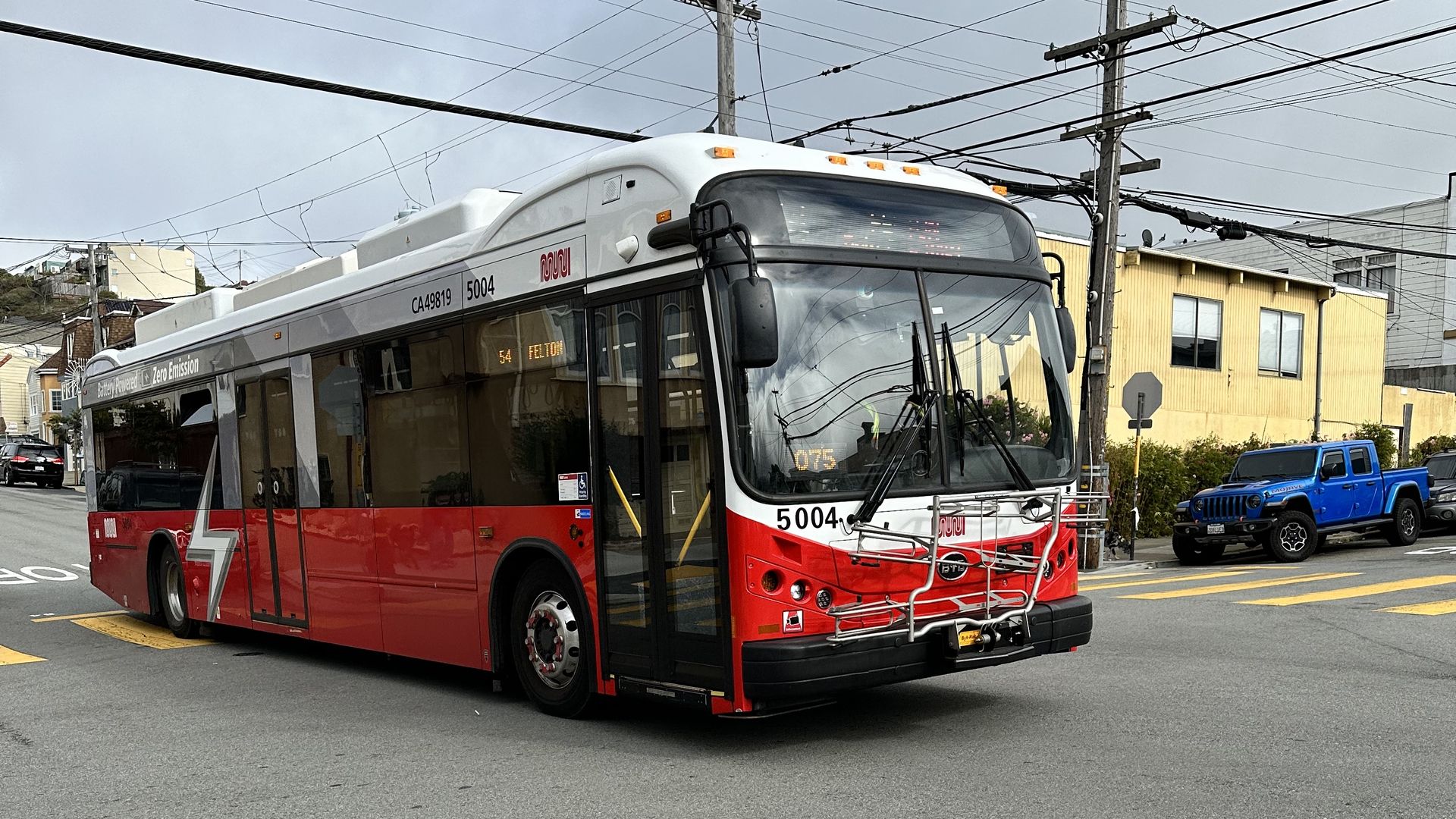San Francisco makes progress on climate plan
Add Axios as your preferred source to
see more of our stories on Google.

A zero-emissions MUNI bus drives through the Excelsior. Photo: Megan Rose Dickey/Axios
Despite California voters rejecting a ballot initiative this week to tax the wealthy to encourage electric vehicle adoption, San Francisco is chipping away at its ambitious plan to be a net-zero emissions city by 2040.
The latest: SF last week accepted $2.4 million in grant funding from the California Energy Commission to launch an e-bike food delivery pilot program, add three electric vehicle charging plazas in Bayview-Hunters Point and more.
- Of the 104 fast-charging stations in the city, there are currently zero in the Bayview.
What they're saying: There's little incentive for residents of the neighborhood, which has "historically been overburdened by air pollution," to transition to EVs, Tyrone Jue, acting director of the SF Environment Department, told Axios.
- "We're creating a signal and creating an opportunity to engage with that community to help them in that transformation to go to a fully electric transportation mode," Jue said.
- "The market, if left to its own devices," he said, would not put chargers in the Bayview because "they would go to where there seems to be greater uptake and adoption of electric vehicles, so they would focus on wealthier zip codes and census tracts."
The big picture: Climate change is contributing to a health crisis, in part due to extreme heat, air pollution and illnesses linked to severe storms.
State of play: San Francisco in July 2021 adopted the goal of being a net-zero emissions city by 2040.
- Since, a handful of federal and statewide policies and programs have emerged to address climate change, like the Inflation Reduction Act, rebates for the purchase or lease of zero-emission vehicles and tax credits to drive EV adoption.
- "We just happened to hit a very sweet spot with our timing," Jue said.
By the numbers: About 47% of SF's greenhouse gas emissions come from transportation, per the mayor's office.
- By 2030, the city wants 100% of new vehicle registrations to be all-electric.
- By 2040, the goal is for all trips starting, stopping or traveling through the city to be emissions-free.
- In the first half of this year, 26% of new vehicle registrations in SF were zero-emission, according to the mayor's office.
- Yes, but: Fewer than 5% of all registered vehicles in SF are electric, per the California Energy Commission.
Reality check: To hit the zero-emissions goal, everyone in the city would need to transition to EVs, ride fully electric buses, bike or walk as their mode of transportation.
- Buildings would also need to convert appliances like stoves and water heaters from gas to electric.
- "The biggest issue … is fossil fuels," Jue said. "That addresses the bulk of the emissions from both the building sector and the transportation sector."
What's next: With input from Bayview-Hunters Point community members, the city will determine where to locate the EV charging stations.
- Jue expects that to take about six months and the construction of the plazas to take about 1.5 years.
- As for the e-bike pilot, it's slated to begin next year.
- The city has tentatively landed on 2035 as the year when commercial buildings need to transition to all-electric, meaning they would replace gas appliances with electric ones.
- "But we want to create enough of a time period where it also doesn’t hurt [commercial building operators] economically," Jue said.
Editor’s note: This article has been corrected to say that there are currently zero fast-charging stations in the Bayview (not zero stations).
